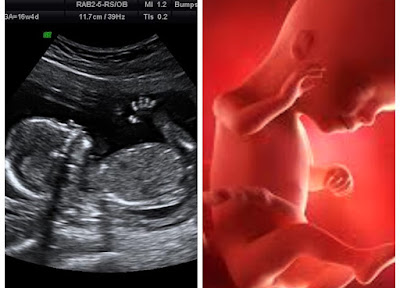16 weeks pregnant | second trimester
16 weeks baby
development
16 weeks pregnant women body changes
Common symptoms
Tips for you
16 weeks pregnant women body changes
Common symptoms
Tips for you
 |
| in the second trimester (16 weeks pregnant) fetus development |
Facts about 16 weeks pregnant woman (second trimester)
In the next three
weeks she'll go through a huge growth spurt, more than doubling her weight.
As your baby grows in size, so does the placenta, which helps to support and
nourish her.
Your baby’s tiny
muscles are getting stronger! Your little one’s head is erect this week, and
coordinated arm and leg movements are now starting to happen.
now your baby is
about the size of a big AVOCADO (measuring
4.6 inches long and weighing in at 3.5 ounces)
The thrilling the thing about this time is you can feel the baby kick,
which could happen to start this week.
The cool fact is your Baby starting to be able to hear
your voice—and he or she will recognize it at birth.
16 weeks pregnant is three months and about three weeks
pregnant.
16 weeks baby development
Umbilical cord:
At this time the umbilical cord is fully developed. one vein and two arteries of the umbilical cord provide all
the essential elements to the baby from the mother’s body and it also helps in
removing all the toxic products from the fetus.
Hearing: Baby starting to be able to hear your voice—and he or
she will recognize it at birth.
Taste buds start developing: Tiny pores on the tongue
have developed, and your baby is tasting and swallowing salty amniotic
fluid as practice for future meals.
Toenails: Little nails are starting to sprout on baby’s
toes. They should be fully grown for around 34 weeks.
Facial muscles: facial muscle has is almost fully
developed and the fetus starts to show few expression like frowns
and squints, even at this early stage.
HEART starts to pump 28 liters of blood in a day.
 |
| 16 weeks pregnancy |
Body changes in 16 weeks pregnant females
- This time is also regarded as the honeymoon phase of pregnancy. At this time a female sleeps more soundly and peacefully.
- Doctors recommend you not to sleep at the backside at this time.
- The pregnancy pillow is also recommended by doctors to give extra comfort to your body.
- Hormones can also stretch the veins, leading to varicose veins.
- You may experience cramps and sharp pains in the leg.
- Exercising and stretching the legs during the day can help relieve these symptoms.
Common symptoms at 16 weeks pregnant.
Nose bleed: The mucous membranes in your nose also
start to swell. This can leave you feeling pretty congested and even give you
the odd nosebleed or two. If you’re really uncomfortable, ask your GP about
pregnancy-safe nasal sprays, or try nasal strips.
Pregnancy glow: Increases of blood flow and the hormone human
chorionic gonadotropin really do make some pregnant women look dewy and
fabulous.
Shortness of breath: With more progesterone, your body is tricking you
into breathing more often and more deeply to get oxygen in, so you may feel
winded from time to time. Also as the baby grows, they will push on your lungs
and make it hard to take full, deep breaths.
Backaches: Your aching
back is a side effect of pregnancy hormones. To ease backaches, make some time
for low-impact exercise. Sit and stand up straight and regularly stretch your
body.
Bigger boobs: Your
breasts have probably gone up several cup sizes by now and should be
completely prepared for breastfeeding by the end of the second trimester.
Constipation: Getting
constipation result of your uterus starting to press on your intestines. Load
up on fiber-rich foods and drink lots of water to keep things moving.
Forgetfulness: This is
also known as (Pregnancy-Brain). No one knows for sure what causes pregnant
women to become more forgetful. It could be biological or it just could be a
result of having lots on your mind!
Dry, itchy, sensitive eyes: it
is the hormones fluctuations in you.
Dizziness: dizziness
might be a side effect of hormones that cause a change in circulation during
pregnancy. Try to stay hydrated, and avoid standing for long periods of time.
Tips for you.
- The doctor will review options for genetic screening on the fetus.
- This could involve
- Simple blood tests or even amniocentesis.
- Genetic screening.
- Blood tests can identify neural tube defects, such as spina bifida.
What medications should I avoid in pregnancy?
Aspirin,
ibuprofen, and other non-steroidal anti-inflammatory drugs (NSAIDs)
These can interfere with the process of blood
clotting. In the last few weeks of pregnancy, they could also cause a problem
with the baby’s heart and lungs.
The use of late in pregnancy, ibuprofen may interfere with labor
or cause you to have less amniotic fluid (waters) around the baby. This is
called oligohydramnios.
A small dose of aspirin is sometimes prescribed in pregnancy (by
your obstetrician). This is considered to be safe.
16 weeks pregnant | second trimester
 Reviewed by OMNIT ARYAN MAURYA
on
Monday, January 13, 2020
Rating:
Reviewed by OMNIT ARYAN MAURYA
on
Monday, January 13, 2020
Rating:
 Reviewed by OMNIT ARYAN MAURYA
on
Monday, January 13, 2020
Rating:
Reviewed by OMNIT ARYAN MAURYA
on
Monday, January 13, 2020
Rating:



1 comment:
Nice blog! Thanks for sharing this blog. It's very helpful for mySecond Trimester Pregnancy Termination blog.
Post a Comment